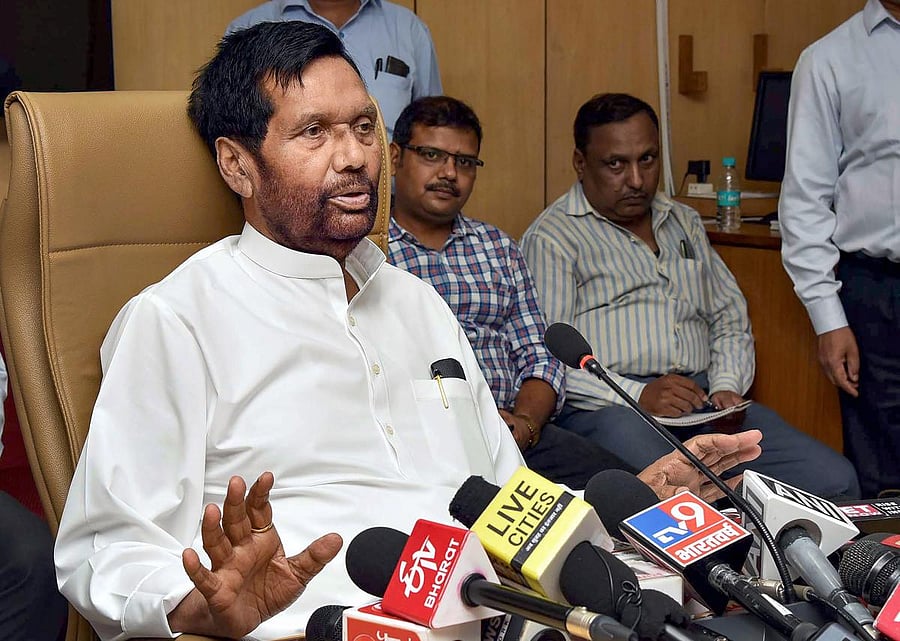
When Consumer Affairs, Food and Public Distribution minister Ram Vilas Paswan’s first press conference in the second Narendra Modi government (NaMo2) was billed as one about restructuring the Food Corporation of India (FCI), it revived hopes that the new government would take bold action on a front where the NaMo1 had dithered – reforming the food economy.
NaMo1 had set up a High Level Committee on Reorienting the Role and Restructuring of FCI under Shanta Kumar in 2014. The committee’s January 2015 report suggested FCI limit its procurement operations to states which lacked the requisite capability and infrastructure, reduce costs by bringing in the private sector and foreign direct investment in a big way and reduce its workforce of loaders drastically by using more of contract labour. However, there was little action, apart from digitising of operations and enhancing FCI’s storage capacity.
Going by Paswan’s press conference, things are not going to be very different this time round as well. Invoking the Shanta Kumar committee report, Paswan said primacy would be given to ensuring that the functioning of FCI is streamlined and fast paced. But this was more about enhancing silo storage capacity for FCI. Now, the committee certainly did dwell at length on this issue. But along with that, it had also recommended a drastic overhaul of how FCI worked, which would bring a drastic reduction in the costs of procurement and a huge jump in efficiency, by rationalising the manpower. This is as important, if not more, than increasing storage capacity.
But the press release put out by the ministry gives rise to some concern on this count. According to it, Paswan said “a big decision is being deliberated upon. . . [to] bring all workers of FCI under a single, uniform system which will bring stability of tenure and secured wages for all”.
A bit of background. There are three categories of labourers in FCI: Departmental labour (numbering 11,887), direct payment system (20,845) and no work no pay system (6,797). The numbers are as of December 2018, according to a press release dated 12 February, 2019. In addition, there were 22,417 contract labourers as of December 2017.
The departmental labour are permanent employees with secure tenures and are the highest paid. Workers under the direct payment are paid piece rates on a percentage basis and get sick leave, weekly offs as well as various social security benefits but are not permanent employees. Those under the no work no pay system are paid on actual quantum of work done and some welfare benefits but no sick leave or weekly offs.
If “a single, uniform system which will bring stability of tenure and secured wages for all” results in the latter two categories being made more akin to the departmental labour, then it will be a downright ill-advised move. It not only flies in the face of a recommendation of the Shanta Kumar committee that reliance on departmental labour should be reduced through greater mechanisation, but also ignores findings of a Comptroller and Auditor General report on the FCI which flagged the issue of surplus labour.
The CAG report had pointed out that a 2007 order by the FCI headquarters that the strength of departmental labour in all food storage depots be assessed and surplus labour redeployed based on needs of depots has been largely ignored. It also quoted a PriceWaterhouse Coopers efficiency study’s recommendation that contract labour was the most economical and should be deployed wherever it was possible. A later study by Deloitte made a similar recommendation, which was accepted by the FCI board. However, FCI was found to be ignoring these recommendations.
The inaction in rationalising surplus labour was found to have led to unproductive expenditure of Rs 33 crore between 2012-13 and 2015-16. Not following PwC’s recommendation cost Rs 51 crore; ignoring the Deloitte recommendation led to excess expenditure of Rs 14.42 crore between August and December 2015. The pampering of workers in various forms – irregular payment of wages during depot closure, booking of departmental labour without adequate work, payment of higher incentives, to name just a few – have cost the Corporation several crores. All of this gets added to the food subsidy bill that is ultimately picked up by taxpayers. This cannot be allowed to continue.
The Shanta Kumar report had noted that around 300 departmental labourers have earned over Rs 4 lakhs a month because of an over-generous and misused incentive system. It said this practice must be discontinued by de-notifying depots (only departmental workers can be deployed in notified depots) or handing them over to states or private agencies. It recommended the increased hiring of contract labour and offering of a voluntary retirement scheme to the departmental workers. It also suggested fixing limits on incentives, so that no person can work more than 1.25 times the daily work assigned to them. There has, regrettably, been no progress on these points.
There is no getting away from the fact that the FCI is a hugely overstaffed albatross around the neck of the food economy. It needs to be drastically pared down. NaMo2 should not repeat NaMo1’s strategy of cherry-picking from the Shanta Kumar committee recommendations – going ahead with increasing storage capacity and digitising operations and stalling on reforming the labour management. This helps no one – neither the farmers from whom foodgrains are procured nor the below poverty line consumers for whom the subsidised foodgrains are meant. It only ends up pampering an already spoilt workforce. Any proposal to increase the permanent workforce needs to be reconsidered. India’s food economy deserves better.
(The writer is a senior journalist and author. She tweets at @soorpanakha)